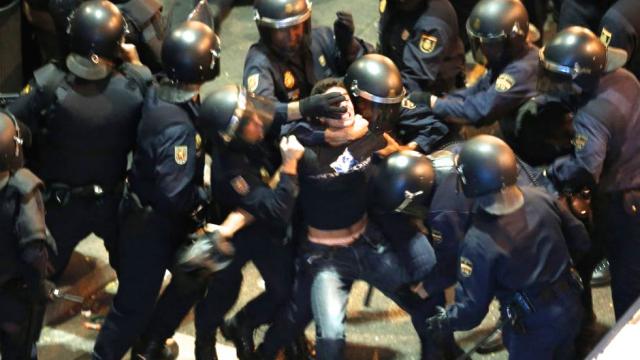
The Spanish government is readying itself for an autumn of discontent, spending nearly €1 billion ($1.29 billion) on riot gear for police units as disparate protest groups prepare a string of demonstrations.
Since June, the interior ministry has tendered four contracts to purchase riot equipment ranging from shields to stab vests. The ministry also finalized its purchase of a new truck-mounted water cannon, an anti-riot measure used during Spain's dictatorship and the transition to democracy but little seen in recent years.
Despite attempts by opposition Socialist politician Antonio Trevín to paint the purchase as "a return to times that we would rather forget," the ministry said in its tender that the water cannon was necessary, "given the current social dynamic."
The government's spending spree comes as groups across Spain are predicting a season of protests. "We're calling it the autumn of confronting power and institutions," said the activist group Coordinadora 25-S which has its roots in the Indignados movement.
Rallies are being planned to counter draft laws by the governing People's Party that would curtail access to abortion in Spain or see unauthorized protests levied fines of up to €600,000 ($775,000). Months after former King Juan Carlos abdicated the throne in favour of his son King Felipe VI, protests are also being planned to demand a referendum on the monarchy.
In Catalonia, the push continues for a vote on independence, while the Canary Islands has said it wants to put the idea of oil exploration in the waters around the region to a referendum.
Amnesty International in Spain said the purchase of riot gear was a worrying development. "They say they buy this material to control disturbances, but how exactly will it be used?" said Amnesty's Ángel Gonzalo.
"In Greece we have documented how these water cannons, when used a short distance, can provoke severe injuries and commotions."
In April, the organization warned in a report that the Spanish government was using harassment and excessive police force to limit the right to protest. Through first-person accounts from several protests in Madrid and Barcelona, they noted that while the vast majority of protesters were peaceful, police treated them similarly to those who incited violence.
The Amnesty International report was made public just one week before a ban on the use of rubber bullets by police came into effect in Catalonia, after a long-fought campaign by seven people who had each lost an eye in Barcelona.
The police officers' union said that the purchases were likely just part of an effort by the government to update obsolete equipment.
"We have a problem with equipment," said Javier Estévez of the Sindicato Unificado de Policia, pointing to a protest last March that left 67 police officers injured.
"We don't have the best or even up-to-date equipment," he said, despite the obligation that the government has to protect the police.
While his group opposed the purchase of the water cannon, he waved aside concerns over the other purchases, noting: "When this gear is used properly, there's nothing wrong with it, because it's in line with Spanish legislation."
3 WAYS TO SHOW YOUR SUPPORT
- Log in to post comments











